The Sustainable City Series, established in November of 2007, is a program of public forums designed to raise the community's awareness of sustainable practices. The ultimate goal of the series is to provide a catalyst for moving Louisville and the region towards a model of sustainability.
Each forum in the series focuses on different aspects of sustainable practice and environmental stewardship. Most events are organized in such a way that several speakers with expertise in the topic of focus will have roughly 30 minutes each to present their information followed by a group question-and-answer session. Typical attendance levels have been above 250 people with some of the most recent events close to 300.
Any opinions expressed during the forums are solely those of the presenters and do not necessarily represent those of the Urban Design Studio or sponsors of the event.
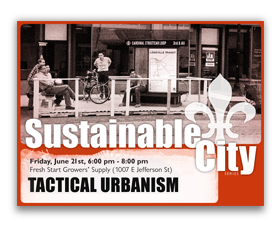 |
Forum 22: Tactical UrbanismFriday, June 21st, 2013, 6:00 – 8:00 pm Mike Lydon, founding Principal of The Street Plans Collaborative and primary author of Tactical Urbanism: Short Term Action, Long-Term Change Vol. 1 and Vol. 2, explained how Louisville could advance long-term visions for the city through short-term Tactical Urbanism interventions through his work around the world. His presentation was followed by a panel discussion moderated by Gabe Bullard (WFPL), which included Dana Duncan (NC3), Shane Corbin (Jeffersonville), and Patrick Piuma (Urban Design Studio). Tactical Urbanism is a fast-growing, international movement to catalyze change in cities by utilizing small-scale pilot projects and other actions to advance long-term change. Some examples include Park(ing) Day, CycLouvia, food trucks, Better Blocks Program, and pop-up retail to name a few. Tactical Urbanism projects frequently involve organizing local community members to utilize inexpensive materials to temporarily transform sites and experiment with what is possible to create a higher quality built environment. The intent is to provide a proof of concept before more expensive infrastructure is committed. These interventions get the community involved and interested in the process, which helps build support and understanding by allowing the community to tangibly visualize the potential of underutilized spaces. MODERATOR: GUEST SPEAKER: ADDITIONAL LOCAL PANAL PARTICIPANTS: |
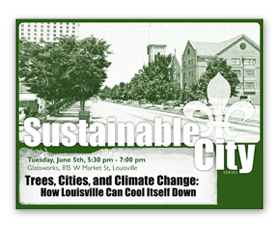 |
Forum 21: Trees, Cities, and Climate ChangeTuesday, June 5th, 2012, 5:30 – 7:30 pm Various characteristics of urban environments contribute to elevated temperatures in our cities known as the urban heat island effect, with the amount of vegetation being one of the leading factors. Recent studies indicate that not only is Louisville heating up faster than other cities, but also our tree canopy has been in a steady state of decline. Dr. Stone, Associate Professor of City and Regional Planning and author of the new book The City and the Coming Climate: Climate Change in the Places We Live discussed the effects of climate change on cities and the role that trees can play in reducing the influence extreme heat events can have on our city. SPEAKER: This event was made possible by the Tree Commission with the generous support of Christina Lee Brown. |
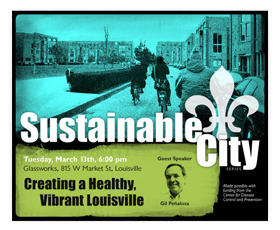 |
Forum 20: Creating a Healthy, Vibrant LouisvilleTuesday, March 13th, 2012, 6:00 pm Creating a healthy, vibrant city is the key to improving our quality of life, one of the most important elements that will attract and retain the most creative and best educated people in the world. In order for our city to rise to the lofty expectionations of our community, we need to not only plan for a vibrant city, but we must act with bold intention and go beyond the benchmarkings of our peer cities and put into action a series of initatives that will make our city an active and attractive place for everyone. Internationally renowned livable city advisor Gil Peñalosa led an engaging and inspirational discussion on how Louisville could become a healthy, vibrant city. SPEAKERS: This event was made possible with funding from the Center for Disease Control and Prevention. |
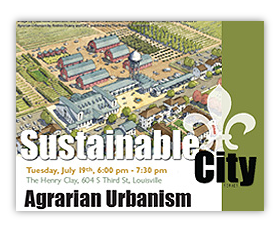 |
Forum 19: Agrarian UrbanismThursday, July 19, 2011, 6:00 pm When considering the health and sustainability of a region, the formal design of our physical environment and the food systems it supports must be an integral part of the equation.Through the 20th Century our society became ever more separated from agriculture and food activities while living increasingly sedentary lives. In some places it is impossible to walk to meet our daily needs. Food production and sales are isolated from where we live. Schools are no longer within walking or biking distances from home. The health impacts of the planning both town and counrty are astounding. In order to reduce our dependence on national and international food systems, we need to develop local agriculture into the very fabric of our neighborhoods and create better relationships with growers and providers. Similarly, these neighborhoods must facilitate and encourage walking and biking as healthy alternatives to the globally devastating dependence on the automobile. The 19th Sustainable City Series forum, AGRARIAN URBANISM, looked at how we can integrate agricultural elements and systems into our new and existing neighborhoods. Andrés Duany explored the idea of developing a society involved with the growing of food and how new models of integrating agriculture into residential environments go beyond retrofitting communities or simply building new ones. Lizz Plater-Zyberk shared innovative work on the health care sector as it seeks to shape a healthy built environment. SPEAKERS: |
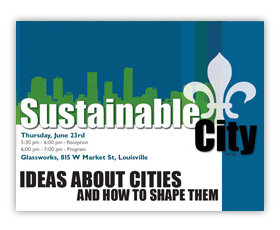 |
Forum 18: Ideas About Cities and How They are ShapedThursday, June 23, 2011 The eighteenth forum of the Sustainable City Series held by the Urban Design Studio in partnership with the Woodrow Wilson International Center for Scholars in Washington D.C. was a moderated panel discussion focused on how cities are shaped. For the first time in history the majority of humans now live in cities. Around the world there are more than a dozen megacities with populations larger than most countries, such as Tokyo. U.S. cities are experiencing general growth as well, though a wide variety of urban forms exist. A number of older industrial cities are losing populations, like Detroit, while sunbelt cities – such as Phoenix, continue to grow at astonishing rates. And there is an interesting third group which led the editors of the Wilson Quarterly magazine to devote a recent issue to a cluster of articles entitled: "The City Bounces Back." These older cities – primarily along the coasts – which had been losing population steadily for a half century and are now experiencing modest population growth or, at least, population stability; cities such as New York, Philadelphia, Boston, Chicago, and Washington D.C. Cities are more fundamental to our economies, societies, and future than ever before. How can we relate these trends to specific cities, such as Louisville? MODERATOR: PANEL PARTICIPANTS: |
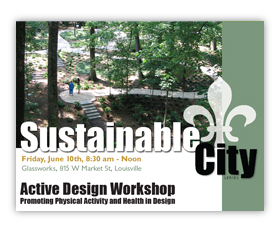 |
Forum 17: Health and the Built EnvironmentFriday, June 10th 2011, 8:30 am – Noon The way a community is designed can affect the health of its residents by encouraging walking, bicycling and other forms of physical activity. Everything from the location of stairways in buildings to the layout of streets can influence our ability to lead active, healthy lives. This Sustainable City Series workshop provided hands-on demonstration of how Active Design Guidelines and other design techniques could be used to increase regular physical activity and healthy eating. Participants were introduced to tools and techniques that help incorporate physical activity into the built environment. It provided a new perspective on the design of buildings and transportation infrastructure and showed how area plans could provide opportunities for healthier living. GUEST SPEAKERS: |
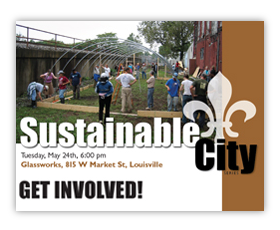 |
Forum 16: Get Involved!Tuesday, May 24th 2011, 6:00 pm It was time for attendees to Sustainable City Series events to get their hands dirty! We have covered a wide array of topics over the past 15 events. This installment focused on how attendees could get directly involved in sustainability. There are a host of local organizations and initaitives focused on providing the tools and networks to successfully transition to a more sustainable lifestyle. From utilizing tools to help track measurable and meaningful results of your sustainability efforts to learning to become a flourishing backyard farmer to working together with your neighbors to create a green neighborhood, attendees had the chances to explore many opportunities that exist to get involved. Attendees had an opportunity to learn how to get involved and get connected with local organizations and initiatives that are moving Louisville and the region towards sustainability with presentations about 15Thousand Farmers, the Green Triangle, and Do Something Green. There were also opportunities to sign up and learn about other organizations, initiatives and programs that had tables at this event. GUEST SPEAKERS: |
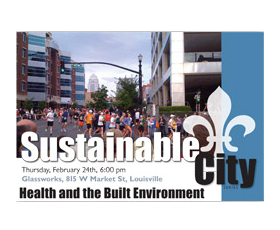 |
Forum 15: Health and the Built EnvironmentThursday, February 24th, 2011, 6:00 pm From the layout and arrangement of streets and highways to houses, businesses, schools and parks, our built environment directly and indirectly affects public health. The growing body of research around the connection between public health and the built environment indicates that we can design communities that benefit the inhabitants from children through to our seniors. In this installment of the Sustainable City Series we will explore tools for creating healthy, sustainable communities as well as Health Impact Assessments (HIAs) as tools to help measure the impact the built environment has on public health. GUEST SPEAKERS: |
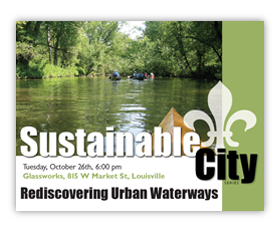 |
Forum 14: Rediscovering Urban WaterwaysTuesday, October 26th, 2010, 6:00 pm Urban waterways, often ignored or veiled features of the built environment, present rich assets for cities when they are redirected from waste carriers to healthy places of beauty, tranquility and recreation. A growing global awareness of water issues and an increased focus on creating more sustainable and ecologically healthy environments has fostered creative approaches to the management of stormwater that are opening the doors to the development of urban waterways as amenities. GUEST SPEAKERS: |
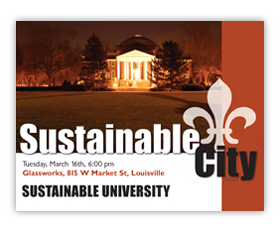 |
Forum 13: Sustainable UniversityTuesday, March 16th, 2010, 6:00 pm Universities play a key role in the promotion and implementation of sustainable practices in our communities. Not only do universities contribute to regional sustainability through fundamental research, but also through education and traingin, community involvement, and the institutions' own development of space, energy policy and environmental programming. Attendees learned about initiatives by the Unversity of Louisville and its partners as well as what initiatives are going on at the University of Kentucky. GUEST SPEAKERS: |
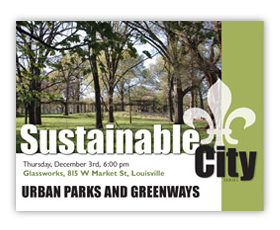 |
Forum 12: Urban Parks and GreenwaysThursday, December 3rd, 2009, 6:00 pm Urban parks and greenways play a vital role in the overall sustainability of a city and region. Parks protect wildlife habitats, provide economic development through place-based economies, cleanse the air, reduce flooding, provide environmental education opportunities, facilitate social gatherings, and offer the possibility for recreation, health, and fitness activities. With the Louisville Loop, Waterfront Park, 21st Century Parks and several other notable initiatives, Louisville is creating one of the most extensive urban park systems in the country. Attendees learned more about the future of Louisville's parks, how they are promoting a sustainable city, and what opportunities existed for public participation. GUEST SPEAKERS: |
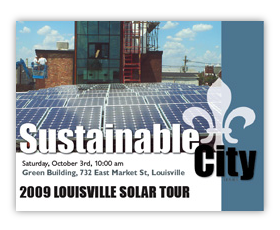 |
Forum 11: 2009 Louisville Solar TourSaturday, October 3rd, 2009, 10:10 am This event is part of the National Solar Tour organized by the American Solar Energy Society (ASES). The Sustainable City Series has partnered with the Louisville Solar Tour to provide attendees the opportunity to learn more about solar power and what others in their community are doing to harness the power of the sun. There were a variety of short speaker presentations as well as opportunities to speak with local leaders in solar energy. Along with solar energy exhibts and the morning presentations there were opportunities to take self-guided tour, provided by the Louisville Solar Tour, of local sites utilizing solar power. GUEST SPEAKERS: |
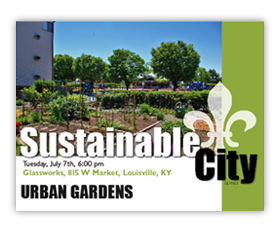 |
Forum 10: Urban GardensThursday, July 7, 2009, 6:00 pm The growing demand for locally grown foods has been accompanied by an ever-increasing interest in the development of community and private gardens. There are many different types of community gardens out there and many more plans and hopes for the future, however there are some things that all these gardens have in common... the environment. The importance of taking the proper steps early on is critical, because even though your food may be grown locally, if you don't know what is in the soil you are using, the food you produce is not necessarily any better than those shipped from thousands of miles away, and perhaps even worse. Attendees learned valuable information about how to responsibly implement community and personal gardens. GUEST SPEAKERS: |
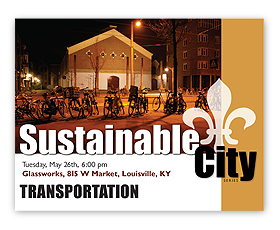 |
Forum 09: TransportationThursday, May 26, 2009, 6:00 pm More efficient transportation systems must be developed in order to provide regional sustainability. Transportation provides the backbone of regional development. City-form has been largely dictated by the available modes of transportation at the time they developed. This can be seen in the compactness of older city centers where the mode of transportation was largely by foot or horse drawn carriage. The placement of cities along navigable waterways such as Louisville was driven by transportation. With the advent of the automobile we see the subsequent development of suburbs spreading farther from the core of urban activity. In order to return to a more sustainable region, transportation modes such as bicycling, rail and bus systems must be developed. Attendees learned what organizations in the region were doing to develop these modes of transportation and how they could be a part of the transformation. GUEST SPEAKERS: |
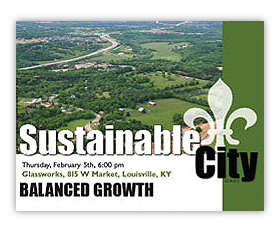 |
Forum 08: Balanced GrowthThursday, February 5th, 2009, 6:00 pm Current development patterns dominated by unsustainable land use patterns that compromise existing communities, our quality of life, and important environmental resources. A response to this has been the practice of smart growth, which is built around the idea that if we can shift toward a more balanced development pattern, it will have tremendous environmental and economic benefits. Attendees heard planning experts from Nashville and the Atlanta area share their experience with how they are preparing for the sustainable development of their communities' future and offer lessons that people in Louisville can take to make our own region more sustainable. GUEST SPEAKERS: |
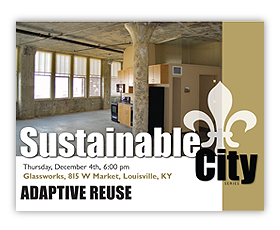 |
Forum 07: Adaptive ReuseThursday, December 4, 2008, 6:00 pm According to noted Historic Preservationist, Donovan Rypkema, "The greenest building is the one already built." As old buildings outlive their original purpose, the lifecycle costs, embodied energy, sustainable advantages of waste reduction, and the benefit of maintaining historic architecture in many cases make it more efficient and environmentally responsible to redevelop them. Adaptive reuse reduces sprawl, preserves neighborhood character and makes our city more sustainable. This event focused on a discussion of the benefits of reusing our existing buildings and how we can make our community more sustainable. GUEST SPEAKERS: |
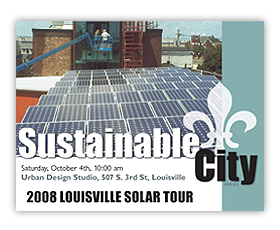 |
Forum 06: 2008 Louisville Solar TourSaturday, October 4, 2008, 10:00 am This event was geared towards people interested in reducing their carbon footprint, utility costs, helping move the country towards energy independence, or just curious to know what other people in the community were doing related to solar energy. The event featured a wide variety of short speaker presentations from architects, developers, homeowners, and others involved in utilizing solar energy. Attendees had an opportunity to speak with local leaders in solar energy. This event was part of a National Solar Tour organized by the American Solar Energy Society (ASES). Following the morning presentations, attendees had the opportunity to take tours of local sites utilizing solar power from homes and multi-unit residential, to school buildings and other commercial uses. GUEST SPEAKERS: |
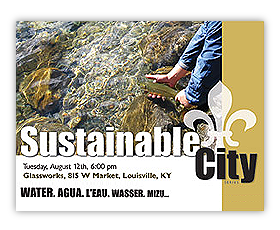 |
Forum 05: WaterTuesday, August 12, 2008, 6:00 pm Vital for life on our planet, fresh water supplies in many parts of the world are under increased stress. Shifting weather patterns, population growth, poor environmental regulations, pharmaceuticals, aging infrastructure, and waste among other factors have led to increases in contamination and reduction in our supply of fresh water. Louisville's own combined sewer system is in trouble due to overflow issues leading to unacceptable levels of wastewater discharge. The event focused on a discussion of water and what attendees could do to help make our city, region, and world more sustainable. GUEST SPEAKERS: |
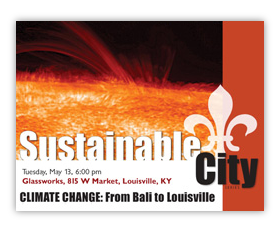 |
Forum 04: Climate Change – From Bali to LouisvilleTuesday, May 13, 2008, 6:00 pm The effects of global warming, such as changes in wind patterns, ocean currents and rainfall are only beginning to be realized. This forum examined the framework for addressing climate change from the level of the United Nations down to what Louisville is doing as a community to address the issue and how attendees could participate. GUEST SPEAKERS: |
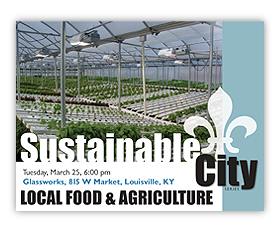 |
Forum 03: Local Food & AgricultureTuesday, March 25, 2008, 6:00 pm Attendees learned about Louisville Metro's local food initiatives, community farms, food access, the slow food movement, farmer's markets and left with actions they could take to support local agriculture as well as ways to access local food. GUEST SPEAKERS: |
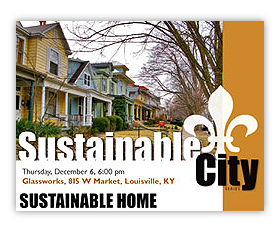 |
Forum 02: Sustainable HomeThursday, December 6, 2007, 6:00 pm Attendees learned how to make their home more energy efficient and environmentally friendly with up to date information about home improvements, energy, materials, appliances and more from professionals. The event featured an in-depth seminar on home efficiency and environmentally sound practices. The Energy Pros took a system approach through the house from foundation to the roof. GUEST SPEAKERS: |
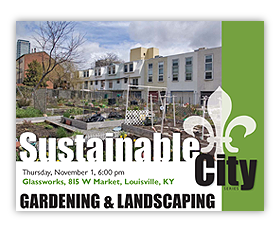 |
Forum 01: Gardening & LandscapingThursday, November 1, 2007, 6:00 pm Through the use of native plantings, rain barrels and other tools and techniques we can conserve resources while enhancing our natural surroundings. The discussion focused on how homeowners, business owners and related professionals can create healthy and resilient landscaped spaces that are beautiful, environmentally responsive, functional, manageable and enduring. GUEST SPEAKERS: |




 View photostream on flickr
View photostream on flickr